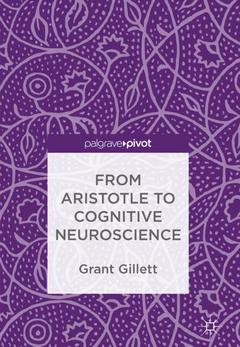Description
From Aristotle to Cognitive Neuroscience, 1st ed. 2018
Author: Gillett Grant
Language: English
Approximative price 63.29 €
In Print (Delivery period: 15 days).
Add to cart166 p. · 14.8x21 cm · Hardback
Description
/li>Contents
/li>Biography
/li>Comment
/li>
From Aristotle to Cognitive Neuroscience identifies the strong philosophical tradition that runs from Aristotle, through phenomenology, to the current analytical philosophy of mind and consciousness.
In a fascinating account, the author integrates the history of philosophy of mind and phenomenology with recent discoveries on the neuroscience of conscious states. The reader can trace the development of a neuro-philosophical synthesis through the work of Aristotle, Kant, Wittgenstein, Husserl, Merleau-Ponty, Brentano and Hughlings-Jackson, among others, and so explore contemporary philosophical puzzles surrounding consciousness and its relation to cerebral synchrony and connectedness.
Of interest to students and scholars of neuroethics, neurophilosophy and philosophy of mind, as well as philosophy of psychiatry, From Aristotle to Neuroscience demonstrates the real essence of consciousness as it increasingly connects with philosophy, law, morality, aesthetics, and spirituality.
Grant Gillett is Professor of Biomedical Ethics at the University of Otago, New Zealand. He received his personal chair in Biomedical Ethics in 1995, and is active in biomedical ethics and neuroethics both nationally and internationally. He is the author of more than 350 articles spanning issues in post-modern philosophy, the philosophy of mind and language, medical ethics, philosophy of medicine, philosophical psychology, and philosophy and psychiatry. He has also authored six books including The Mind and its Discontents (Oxford University Press).
Provides an up-to-date survey of thinking in cognitive neuroscience, the neurophilosophy of human consciousness and neuroethics
Links current themes in the area to their historical origins and forebears, making connections between phenomenology, embodied cognition, philosophy of mind, and neuro-science
Explores applications for the neurophilosophical analysis for aesthetics and ethics, and so taps into topical and popular trends in scholarship
These books may interest you

The Husserlian Mind 250.90 €



